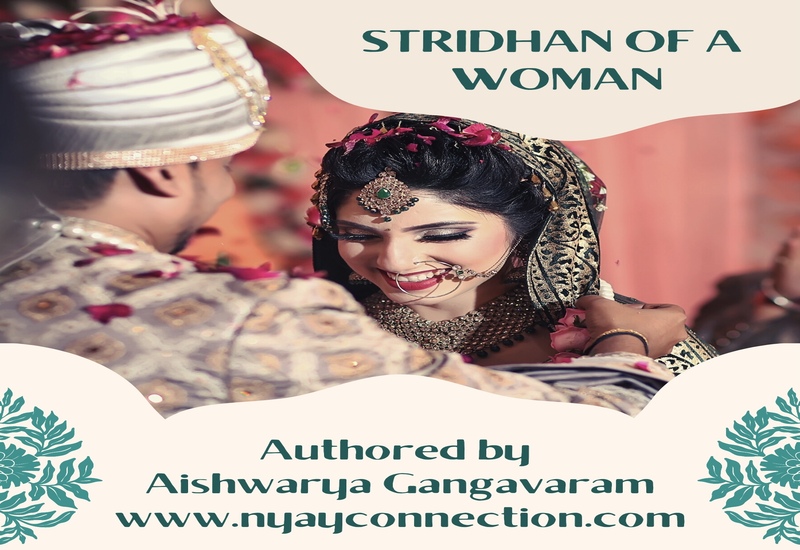Stridhan is a term used in Indian culture to refer to the wealth, property, or assets that a woman acquires either through inheritance or by gift, before or after her marriage. Stridhan literally means “the wealth of the woman”.
Traditionally, stridhan is considered the sole property of a woman and cannot be claimed by anyone else, including her husband, without her consent. It is usually given to a woman by her parents or relatives at the time of her marriage or at other significant milestones in her life, such as the birth of a child.
Stridhan is considered to be a symbol of a woman’s financial independence and her right to own and manage her own property. It also serves as a means of financial security for a woman in case of any unforeseen circumstances, such as divorce or widowhood.
In India, the law recognizes the importance of Stridhan and provides legal protection to women’s property rights. The Hindu Succession Act, 1956, provides that Stridhan is the absolute property of a woman and that she has the right to dispose of it in any manner she wishes, including through gift or will.
WHAT CONSTITUTES STRIDHAN OF A MARRIED WOMAN:
Stridhan of a married woman can include any property or wealth that she acquires through inheritance, gift, or other means, either before or after marriage. The exact composition of Stridhan can vary based on individual circumstances, cultural norms, and legal requirements.
Some examples of what can constitute Stridhan of a married woman are:
Jewellery: Jewellery is often given to a woman by her parents, husband, or in-laws as a gift or inheritance. This can include gold, silver, diamond, or other precious stones.
Cash and investments: Any cash or investment that a woman has in her name, including bank accounts, stocks, bonds, and mutual funds, can be considered as Stridhan.
Property: Any immovable property, such as land or a house, that a woman acquires through inheritance, gift, or purchase, can be considered as Stridhan.
Household items: Household items such as furniture, utensils, and other household goods, that a woman acquires through gift or inheritance, can also be considered as Stridhan. It’s important to note that Stridhan is considered the exclusive property of the woman, and she has the power to dispose of it as she sees fit. It’s also protected under Hindu law, and women can enforce their rights to Stridhan through legal means if necessary.
CHARACTERISTIC FEATURES OF STRIDHAN:
Exclusive Ownership: Stridhan is considered the exclusive property of the woman who receives it. This means that the woman has the absolute right to use, manage, and dispose of it as she sees fit, without any interference from her husband or other family members.
Non-Transferrable: Stridhan cannot be transferred by the woman during her lifetime, as it is considered her exclusive property. Any attempt to alienate or dispose of Stridhan without the woman’s consent is considered illegal under Indian law.
Non-Inheritable: Stridhan cannot be inherited by anyone other than the woman who receives it. This means that upon the woman’s death, her Stridhan will not pass on to her heirs or family members unless she has expressly bequeathed it to them in a will.
Recognized by Law: Stridhan is recognized and protected by Indian law. Any attempt to appropriate, misuse, or dispose of Stridhan without the woman’s consent is considered a criminal offense under the Indian Penal Code.
Source of Empowerment: Stridhan is considered an important source of economic and social empowerment for women in India. It enables women to accumulate and control assets that can provide them with financial security and independence, as well as enhance their status within the family and society.
Stridhan is an exclusive property of the woman who receives it, which cannot be transferred or inherited by anyone else. It is recognized and protected by Indian law and is an important source of empowerment for women in India. She can sell, gift, mortgage, lease, and exchange in any manner she desires. However, some restrictions were recognized on her power of disposal, if she was a married woman.
If woman is married, the Stridhan was classified under two heads:
a) The Saudayaka and
b) Non-Saudayaka.
Woman has full rights over any property which received by the means of gift and affection and the property which she received from stranger or acquired by self-exertion or any other mechanical art cannot be alienated without the consent from her husband. A Hindu female can acquire or secure the property from numerous sources but every property cannot be Stridhan.
INDIAN LAW RELATING TO STRIDHAN:
In India, the concept of Stridhan is recognized under the Hindu law, which governs the property rights of Hindus, Buddhists, Jains, and Sikhs. Under Hindu law, Stridhan is considered to be the exclusive property of a woman, which she is entitled to receive either before or after her marriage, through inheritance, gift, or will.
The Hindu Succession Act, 1956, provides legal protection to women’s property rights, including Stridhan. Section 14 of the Act provides that any property acquired by a woman through inheritance, gift, or will shall be her absolute property, and she can dispose of it in any manner she desires.
Furthermore, the Indian Penal Code (IPC) has provisions for the protection of a woman’s Stridhan. Section 405 of the IPC deals with criminal breach of trust, which includes misappropriation or conversion of a woman’s Stridhan by her husband or his family members. If a person is found guilty of criminal breach of trust, he/she can be punished with imprisonment for a term that may extend to three years, or with a fine, or with both.
In addition to the above, the Protection of Women from Domestic Violence Act, 2005, also recognizes a woman’s right to her Stridhan and provides for protection against any attempt to take away her Stridhan or use it for any purpose without her consent.
Indian law recognizes the importance of Stridhan in a woman’s life and provides legal protection to her property rights, ensuring that she has control over her financial resources and is not subjected to any form of exploitation or discrimination.
IMPORTANCE OF STRIDHAN TO WOMEN:
Stridhan holds significant importance to women in India, both culturally and legally. Here are a few reasons why:
Financial Independence: Stridhan is seen as a woman’s financial security and independence. It gives women a sense of empowerment and control over their financial resources, which in turn allows them to make important decisions about their lives.
Cultural Significance: In Indian culture, Stridhan is considered a symbol of love, respect, and trust towards the bride. It is given to her by her family as a token of their appreciation and blessings.
Protection against Adverse Situations: Stridhan acts as a safety net for women during difficult times such as divorce, widowhood, or other unforeseen circumstances. In such situations, Stridhan provides women with financial support and helps them to start a new life.
Legal Protection: Stridhan is recognized and protected by Indian law. This gives women the legal right to own and dispose of their property as they see fit, without fear of any interference or exploitation from their husbands or in-laws.
Empowerment: The ownership of Stridhan empowers women to make their own choices and live their lives on their own terms. It helps them to break free from patriarchal norms and gain autonomy and agency in their lives.
Stridhan is crucial for women in India as it enables them to live a life of dignity, independence, and empowerment.
INHERITANCE:
When it comes to the inheritance of Stridhan, the general rule is that it cannot be inherited by anyone other than the woman herself. This means that upon the woman’s death, her Stridhan will not pass on to her heirs or family members unless she has expressly bequeathed it to them in a will. However, if the woman dies without leaving a will, her Stridhan will devolve upon her legal heirs according to the provisions of the Indian Succession Act,1925. The legal heirs can include her husband, children, parents, and siblings, depending on the circumstances of the case.
It is important to note that even if the woman’s legal heirs inherit her Stridhan, they do not have the right to dispose of or use it without her consent. Stridhan is considered the woman’s exclusive property, and any attempt to appropriate or misuse it by her heirs or family members is considered illegal under Indian law. Overall, while Stridhan can be inherited by the woman’s legal heirs upon her death, it is still considered her exclusive property, and any attempt to alienate or misuse it without her consent is prohibited by law.
WOMEN ESTATE AND STRIDHAN UNDER INDIAN LAW:
In India, Women Estate and Stridhan are two distinct legal concepts that relate to women’s property rights. Women Estate refers to the property that a woman owns, acquires, or inherits during her lifetime. It includes all kinds of movable and immovable property, such as cash, bank accounts, jewellery, land, buildings, and other assets that a woman may acquire through inheritance, gift, purchase, or any other legal means. Stridhan, on the other hand, refers to the property and assets that a woman receives as gifts, inheritance, or other forms of transfer, either before or after marriage.
Under Indian law, Women Estate can be broadly classified into two categories: separate and joint.
a. Separate Women Estate: This refers to the property that a woman owns and controls exclusively. It includes all the assets that she acquires before or after marriage, such as her income, savings, investments, and any property that she inherits or receives as gifts. The woman has the absolute right to manage, use, and dispose of her separate Women Estate as she sees fit, without any interference from her husband or other family members.
b. Joint Women Estate: This refers to the property that a woman owns jointly with her husband or other family members. It includes any property that the woman acquires during her marriage, such as jointly owned land, buildings, bank accounts, and other assets. While the woman has a share in the joint Women Estate, her husband or other family members may also have a claim to it, depending on the nature of the property and the ownership rights.
Women Estate includes all the property that a woman owns or acquires during her lifetime, both separate and joint. It is an important concept in Indian law as it recognizes a woman’s right to own and control her property, which is essential for ensuring her economic and social empowerment.
DIFFERENCE BETWEEN WOMEN ESTATE AND STRIDHAN :
Source of Ownership: The primary difference between Women Estate and Stridhan is their source of ownership. Women Estate refers to the property that a woman owns or acquires during her lifetime, whether through inheritance, purchase, or other means. Stridhan, on the other hand, refers to the property that a woman receives as gifts or transfers from her family members, either before or after marriage.
Nature of Ownership: Another key difference between Women Estate and Stridhan is the nature of ownership. Women Estate is considered the absolute property of a woman, and she has the right to use, manage, and dispose of it as she sees fit. Stridhan, on the other hand, is considered the exclusive property of a woman, but it is subject to certain restrictions, such as the right of her husband or his family members to use it for specific purposes, such as the marriage expenses of their children.
Inheritance: In terms of inheritance, Women Estate is passed on to the woman’s legal heirs, such as her children, in case of her death. Stridhan, on the other hand, is considered the woman’s absolute property, and she has the right to decide who will inherit it after her death.
Legal Protection: Both Women Estate and Stridhan are protected by Indian law, but they are governed by different legal provisions. Women Estate is protected under various laws, such as the Hindu Succession Act, 1956, which grants equal rights to women in ancestral property. Stridhan is protected under the Hindu Personal Laws and other relevant provisions, which ensure that a woman’s property rights are safeguarded, and any attempt to appropriate or misuse her Stridhan is considered illegal.
In short, while Women Estate and Stridhan both relate to women’s property rights, they differ in terms of their source and nature of ownership, inheritance, and legal protection. Understanding these differences is essential for ensuring that women’s property rights are fully protected under Indian law.
Here are some landmark cases of the Supreme Court of India related to Stridhan:
1) V. Tulasamma vs. Sesha Reddy (1977): This case is considered a landmark judgment as it clarified the definition of Stridhan under Hindu law. The court held that any property given to a woman, either before or after marriage, by her parents or relatives, constitutes Stridhan. The court also ruled that the woman has absolute ownership over her Stridhan, and it cannot be appropriated by her husband or his family members.
2) Smt. Sunita vs. Dharampal Singh (2019): In this case, the Supreme Court held that a husband cannot sell or mortgage his wife’s Stridhan without her consent. The court directed the husband to return the Stridhan to his wife, which he had sold without her knowledge or consent.
3) Shumita Didi Sandhu vs. Sanjay Singh Sandhu (2000): In this case, the court held that a woman’s Stridhan remains her exclusive property, and her husband has no right to it unless she voluntarily transfers it to him. The court also emphasized that a husband or his family members cannot use Stridhan for any purpose without the woman’s consent.
4) Rajesh Sharma vs. State of UP (2017): In this case, the Supreme Court directed the police to set up family welfare committees to assist in cases of domestic violence and harassment related to Stridhan. The court also held that Stridhan should be returned to a woman upon the dissolution of her marriage.
These cases have been instrumental in clarifying and strengthening women’s property rights related to Stridhan. They have emphasized that Stridhan is the exclusive property of a woman and cannot be taken away or used without her consent. These judgments have also played a crucial role in protecting women from exploitation and abuse and ensuring that they have the legal right to exercise control over their property.
One of the recent cases relating to Stridhan in India is the 2020 judgment of the Supreme Court in the case of Satish Chander Ahuja v. Sneha Ahuja.
In this case, the wife had filed a complaint against her husband and in-laws, alleging that they had unlawfully retained her Stridhan, which included gold ornaments, cash, and other valuables. The trial court had acquitted the accused, but the Delhi High Court had reversed the verdict and convicted them for the offence of criminal breach of trust under Section 406 of the Indian Penal Code. The accused had appealed to the Supreme Court, arguing that the complaint was false and that they had not retained any Stridhan belonging to the wife. The Supreme Court, however, upheld the conviction and observed that the accused had failed to provide a satisfactory explanation for the disappearance of the Stridhan, which had been given to the wife by her parents.
The Supreme Court also reiterated the importance of Stridhan in Indian law and observed that it is the exclusive property of the woman who receives it. The court further stated that any attempt to misappropriate or retain Stridhan without the woman’s consent is a criminal offence and must be dealt with severely.
This highlights of this case continued the relevance and importance of Stridhan in India and the need for strict enforcement of the law to protect women’s rights to their property.
This article is written by Aishwarya Gangavaram. Aishwarya is a law student from Padala Rama Reddi Law College, Hyderabad. For feedback relating to this article, you may email her at gvaishwarya08@gmail.com.
If you are also a law student or professional and wish to contribute to this website, you may submit your article at nyayconnection@gmail.com.




